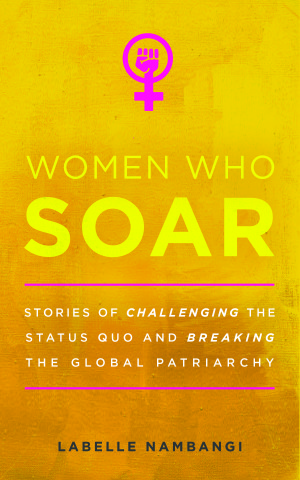
Add LaBelle Nambangi’s name to the great fight of challenging the status quo. In her book, Women Who Soar, LaBelle educates women on gaining their own independence and finding their own voice through storytelling. In our interview with her, she talks in depth about her experiences, other authors that have influenced her and how she came to be the great LaBelle.
Wise Ink: Who are some of my favorite writers?
LaBelle Nambangi:
Chimamanda Ngozi Adichie
Imbolo Mbue
Paulo Coelho
Maya Angelou
Sophia Nelson
Chinua Achebe
WI: Who are some writers that have influenced you?
LN: Chimamanda Ngozi Adichie, Maya Angelou, Sophia Nelson are some of the writers who have greatly influenced me. I enjoy Maya Angelou’s unique writing styles; a combination of prose poetry and her use of direct conversational voice is captivating. Chimamanda Ngozi Adichie unique writing style of using imagery, dialogue and character’s personal points of view enables the readers to know each character and draws the reader more. I do relate to her upbringing and stories. I especially enjoy Sophia Nelson’s The Woman Code as it is about transforming women’s lives – enabling women to discover their personal power, live up to their highest potential, love themselves unconditionally and do same for other women. These ideologies strongly resonate with me as I have been teaching and demonstrating this philosophy to the teenage girls I have worked with over ten years. My book, Women Who Soar is along those same lines giving women practical examples of women they can emulate to change their lives and do same for other women especially those marginalized and disenfranchised.
WI: Tell us a little bit about your story, Women Who Soar.
LN: My book Women Who Soar is about how ordinary women can challenge the status quo, the roadblocks, the gender discrimination we experience which holds us back from being our authentic selves by learning from the stories of the women included in the book. It is about women learning how to create financial stability for themselves and other women in their communities. It is about women using their God-given skills and talents to break out of the box of prescribed societal norms to design their own lives. It is about women being allies of other women as opposed to rivals, competitors which were the old paradigm. It is about men and
women working together to fight against gender discrimination acknowledging that women’s right is human’s right. It is about us all as humans recognizing that we all suffer when women are discriminated against and we cheat ourselves and the world from the contributions women can make. It is about emphasizing the power and effect of women’s contributions in society if given equal opportunities as men as stated in this old adage: Give a man a fish, and he eats for a day. Teach a man to fish and he eats for a lifetime. But teach a woman to fish, and everyone eats for a lifetime.
WI: What inspired you to write the book, Women Who Soar?
LN: While working with teenagers girls and carrying on candid conversations about gender issues, it was clear that the girls regarded other females as rivals and competitors which they justified as the true nature of women as haters of one another. The girls also considered themselves inferior to boys because of the gender discrimination they were subjected to at home, community and the world. They believed that as girls they were not complete in their own rights and could not attain financial stability and independence on their own merits without help from men. These same sentiments were expressed by some of the women we worked with who believed that every woman’s greatest achievement is marriage as women are not complete without men. The women believed they are inferior because of their gender and are not capable of affecting change. In discussing role models with the girls, they stated that they did not consider their mothers, women in their families and women in their communities as their role models because they are weak – did not stand up to the men in their lives, hands over their paychecks to their husbands, are in abusive relationships, dependent and the list went on. For these reasons the girls only look up to celebrities, whom they believe are independent, self-sufficient, financially stable, and in control of their lives. When asked if they believed they could attain the same level of success like their role models, they responded in the negative – Celebrities are from affluent families, society favors their class, race, ethnicity and they are not bound by the same type of cultural and religious expectations as the girls. I decided to write this book to showcases women from every work of life, background, ethnicity and educational level who challenged the status and designed their lives. To showcase ordinary women who are making tremendous changes in their lives, the lives of other women and society as a whole to empower the girls to start believing in their own abilities.
WI: What are you hoping people gain from reading your book?
LN: My hope is that the reader will be empowered and inspired by the stories of the people of change shared in the book. To emulate their actions and join them in challenging whatever status quo is holding them back from becoming their authentic selves, and do the same for others. I want the readers to recognize their value, and realize they are a complete being in their own right, become a person of change and recognize their role for the next generation. A person of change believes that women are inherently equal to men and that we all will benefit once societies and cultures reflect this natural equality.
WI: What’s your favorite under-appreciated novel?
LN: The White Man of God by Kenjo Jumbam
WI: How can we purchase your book?
LN: My book will be available for purchase on Amazon, Facebook, and Barnes and Nobel.
